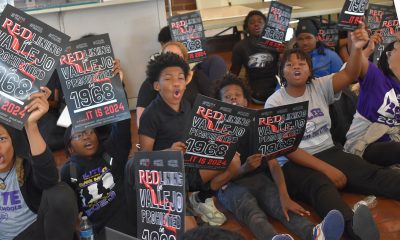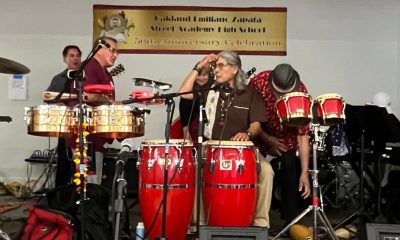Education
Legislature to Gov. Newsom: Make Ethnic Studies a High School Graduation Pre-Requisite
Sponsored by Assemblymember Jose Medina (D-Riverside), AB 101 requires all public school districts and charter schools serving students in grades 9 through 12 to offer culturally responsive curricula reflective of California’s diverse population.

For the second time since he became governor, Gavin Newsom is being asked by the California Legislature to sign a bill that would make ethnic studies a California high school graduation requirement.
Days before the end of the 2021 Legislative session, by overwhelming margins, the State Assembly and Senate approved Assembly Bill (AB) 101. It would require high schools to offer ethnic studies courses beginning academic year 2025-26 and make completing a one-semester course a graduation requirement starting in the 2029-30 school year.
Sponsored by Assemblymember Jose Medina (D-Riverside), AB 101 requires all public school districts and charter schools serving students in grades 9 through 12 to offer culturally responsive curricula reflective of California’s diverse population.
The state has more than 1,000 public school districts enrolling 6.2 million students speaking more than 90 languages. More than three-quarters of California’s K-12 students are non-white: 55% Latino, 22% white, 12% Asian or Pacific Islander and 5% African American.
According to Medina, a former ethnic studies teacher, “California is one of the most diverse states in the country and we should celebrate that diversity by teaching a curriculum that is inclusive of all of our cultures and backgrounds. Ethnic Studies provide students an opportunity to learn about histories outside of the Euro-centric teachings most prominent in our schools. At a time when the national climate drives divisiveness and fear of otherness, Ethnic Studies can play a critical role in increasing awareness and understanding.”
Last year, Newsom, who has expressed support of ethnic studies, vetoed a similar bill, AB 331.
He expressed concerns about the content of the Ethnic Studies Model Curriculum that was being developed as a template to guide school districts as they created their own versions of the course. Newsom called the draft model curriculum “insufficiently balanced and inclusive and needed to be substantially amended.”
Initial reaction to the Department of Education (CDE) Instructional Quality Commission’s (IQC) Ethic Studies Model Curriculum was strongly negative. During two years of heated debates, it produced several versions of the curriculum and attracted nearly 100,000 public comments.
The drafts drew complaints from Jewish Americans and other ethnic and religious groups who said their American experiences were being ignored. Jewish Americans expressed concerns that the curriculum evoked anti-Semitic stereotypes and dwelled on the Israeli-Palestinian conflict. Others criticized the curriculum for taking a left-leaning and politically biased view of history. For example, it defined capitalism as a system of oppression.
Revisions to the model curriculum were made and it was adopted by the State Board of Education this past March. The 894-page curriculum with more than two dozen lesson plans is designed to teach students about the history, culture and struggles of four historically marginalized racial and ethnic groups: African Americans, Asian Americans, Latinos and Native Americans. The guidelines also include supplemental lessons on Jews, Armenians and Sikhs in response to public comments received.
School districts and charter schools are not required to adopt CDE’s model curriculum. AB 101 lets them pick the elements they like from the model curriculum— or choose none of them. They can develop ethnic studies courses on their own. The course must be approved by the governing board of the school district or the governing body of the charter school, and the courses must be approved as meeting the A–G requirements of the University of California and the California State University.
AB 101 is supported by State Superintendent of Public Instruction Tony Thurmond and a coalition of educators, students, and advocates across the state. Supporters include the California Teachers Association, the California State PTA, Hispanic Association of Colleges and Universities, California Association for Bilingual Education, and The Education Trust-West.
Over the weekend, at the California Association of African American Superintendents and Administrators (CAAASA) 2021 Annual Round-Up, Thurmond was applauded by the group when he said, “I hope you’ve heard the good news. AB 101, the bill to require ethnic studies as a graduation requirement has been passed and is on its way to the governor’s desk for signature.
“Our babies deserve to learn about the contributions of their ancestors. Our African American children, our Latino children, our Native American, Pacific Islander children, deserve to hear the positive contributions of their ancestors, who helped to make this a great state, and a great nation.”
Also unanimously supporting AB 101 are the five diversity caucuses of the California State Legislature: the Latino caucus, the Asian Pacific Islander caucus, the Black caucus, the Jewish caucus and the Native American caucus.
The statement from the California Legislative Black Caucus (CLBC) leaders chair Sen. Steven Bradford (D-Gardena) and vice-chair Sen. Sydney Kamlager (D-Los Angeles) reads, “As chair of the Legislative Black Caucus, I am proud to stand with Assembly member Medina in support of the amendments to AB 101, … it is critical that ethnic studies be immediately included as a graduation requirement to help reduce further racial bias and create understanding. History is often taught with oppression and racism in the periphery or sometimes erased altogether. It is imperative that all students leave our education system with a deeper understanding of the communities that make California and America culturally diverse and strong.”
As Newsom decides whether or not to sign AB 101, criticism of the bill persists.
The anti-Semitism watchdog AMCHA Initiative writes, “My organization is deeply concerned that classes taught using [the Ethnic Studies Model Curriculum] will become vehicles for highly controversial, one-sided and extremely coercive political advocacy and activism that will both subvert the educational mission of our schools and incite bigotry and harm against many students…, we believe it is irresponsible and unethical to pass a bill requiring students to take a course that has not been shown to improve students’ academic achievement, and is quite likely to incite strife and hatred.”
Republican legislator opposition can be summed up in a comment Sen. Melissa Melendez (R-Lake Elsinore) made recently. Debating AB 101, Melendez said that ethnic studies is rooted in “critical race theory,” a view that racism is ingrained in laws and government institutions.
Ahead of his recall election on September 14, Newsom will likely avoid signing any bills until after the election, fearing he could motivate critics to vote in favor of the recall.
He has until October 10 to sign the bill.
Activism
S.F. Black Leaders Rally to Protest, Discuss ‘Epidemic’ of Racial Slurs Against Black Students in SF Public School System
Parents at the meeting spoke of their children as no longer feeling safe in school because of bullying and discrimination. Parents also said that reported incidents such as racial slurs and intimidation are not dealt with to their satisfaction and feel ignored.

By Carla Thomas
San Francisco’s Third Baptist Church hosted a rally and meeting Sunday to discuss hatred toward African American students of the San Francisco Unified School District (SFUSD).
Rev. Amos C. Brown, president of the San Francisco NAACP and pastor of Third Baptist Church, along with leadership from local civil rights groups, the city’s faith-based community and Black community leadership convened at the church.
“There has been an epidemic of racial slurs and mistreatment of Black children in our public schools in the city,” said Brown. “This will not be tolerated.”
According to civil rights advocate Mattie Scott, students from elementary to high school have reported an extraordinary amount of racial slurs directed at them.
“There is a surge of overt racism in the schools, and our children should not be subjected to this,” said Scott. “Students are in school to learn, develop, and grow, not be hated on,” said Scott. “The parents of the children feel they have not received the support necessary to protect their children.”
Attendees were briefed last Friday in a meeting with SFUSD Superintendent Dr. Matt Wayne.
SFUSD states that their policies protect children and they are not at liberty to publicly discuss the issues to protect the children’s privacy.
Parents at the meeting spoke of their children as no longer feeling safe in school because of bullying and discrimination. Parents also said that reported incidents such as racial slurs and intimidation are not dealt with to their satisfaction and feel ignored.
Some parents said they have removed their students from school while other parents and community leaders called on the removal of the SFUSD superintendent, the firing of certain school principals and the need for more supportive school board members.
Community advocates discussed boycotting the schools and creating Freedom Schools led by Black leaders and educators, reassuring parents that their child’s wellbeing and education are the highest priority and youth are not to be disrupted by racism or policies that don’t support them.
Virginia Marshall, chair of the San Francisco NAACP’s education committee, offered encouragement to the parents and students in attendance while also announcing an upcoming May 14 school board meeting to demand accountability over their mistreatment.
“I’m urging anyone that cares about our students to pack the May 14 school board meeting,” said Marshall.
This resource was supported in whole or in part by funding provided by the State of California, administered by the California State Library via California Black Media as part of the Stop the Hate Program. The program is supported by partnership with California Department of Social Services and the California Commission on Asian and Pacific Islander American Affairs as part of the Stop the Hate program. To report a hate incident or hate crime and get support, go to CA vs Hate.
Community
ELITE Charter School Conducts Sit-In Protest at Vallejo City Hall After City Council Vote
ELITE Public School staff and students staged a sit-in at Vallejo City Hall on Wednesday afternoon to protest the City Council’s decision to vote against their Major Use Permit to expand into downtown. “We are deeply troubled by the turnover of the 6-1 vote, which we believe to be red-lining in 2024,” said Dr. Ramona Bishop, CEO of ELITE Public Schools.

By Magaly Muñoz
ELITE Public School staff and students staged a sit-in at Vallejo City Hall on Wednesday afternoon to protest the City Council’s decision to vote against their Major Use Permit to expand into downtown.
“We are deeply troubled by the turnover of the 6-1 vote, which we believe to be red-lining in 2024,” said Dr. Ramona Bishop, CEO of ELITE Public Schools. “We have followed all the requirements set forth for approval by the city and are dismayed by this sudden reversal of fortune. Our sit-in at City Hall is a testament to our unwavering commitment to justice and fairness.”
The sit-in was triggered after the Vallejo City Council members held a lengthy, special meeting on Tuesday evening to continue discussing the April 23 appeal that was made against the Planning Commission’s decision to grant ELITE a permit for expanding their charter high school into a retrofitted building in the heart of downtown.
During the deliberations, various options were presented to the Council for approving the project. These included a provisionary review period for the permit and imposing extensive conditions, such as limiting student enrollment.
The ELITE plan was to accommodate a maximum capacity of 400 students at their proposed school site, starting with an initial rollout capacity of 200 students in the first year.
Bishop rejected the suggestion by the City Council for a smaller charter capacity because the funding for the school was based on the projected number of students they would eventually seat.
During the meeting, council members complained about the lack of availability of economic impact reports that assessed the school’s potential impact on Vallejo’s downtown area.
Economic Development Director Michael Nimon sent a letter to the City Council, stating that while there was no official report, schools serve as economic generators to the surrounding areas of where they’re located.
“Schools also diversify uses and create pedestrian activity by bringing more people to downtown. Diversification of uses makes local economy more resilient by balancing residential, commercial, office, entertainment, and institutional uses,” Nimon’s letter said.
The letter also states that foot traffic is needed in an area of Vallejo that currently has minimal activity and the presence of the proposed school will likely not disturb any future developments.
Despite this, the council dismissed the letter as “merely an opinion” and not anything based on fact or concrete data.
Councilmember Peter Bregenzer, who remained silent throughout most of the seven-hour discussion, ultimately motioned for City staff to draft a resolution to approve the appeal and deny the project. The motion passed by a 4-3 vote.
About 50 students gathered on the second floor of the City Hall building where they chanted “Say it loud, say it clear, we don’t want no racists here” and “Where is the mayor? Bring him out, bring him out.”
The proposed high school has sparked intense debate, with many speculating that those opposed to the school are saying no to the expansion because the majority of the students are Black and Brown.
Retired Solano County Judge Paul Beeman and his wife, Donna, who filed the appeal against the school, have consistently denied that their opposition stems from racism or personal feelings toward anyone associated with the school.
In interviews with the Post, the Beemans seem to regard the proposed high school as a “nuisance” and an ill-advised choice for downtown development. They claim that it would be ineffective in economically revitalizing the community. However, they have provided no substantial evidence to support their opinions.
In contrast, ELITE has drawn parallels to redlining in relation to the community’s opposition to the proposed school location. Redlining refers to the discriminatory practice in which mortgage companies and other financial services systematically withhold loans and access to predominantly white neighborhoods from racial and ethnic minorities, particularly Black and African American communities.
“We’ve been fighting for this school for two years. We’re going to make our emergency, their emergency,” one student said in reference to Vallejo Mayor Robert McConnell’s previous comments about not rushing to make a decision on the school permit.
Within two hours of the start of the sit-in at City Hall, the City of Vallejo issued a statement that the building would be closed for the rest of the day because of the protest. The statement said that the loud noise from the protesters “hindered staff and visitors’ ability to conduct regular business.”
Although the mayor was not present at City Hall on Wednesday afternoon, interim City Manager Beverli Marshall addressed the ELITE group to answer several questions the students had. She explained the appeal process, how the different city officials played a role in the decision, and what the possible outcomes could be after the Council makes its final decision in a few weeks.
Students and staff were ultimately upset that they were being treated like criminals and that all their work over the last two years might be in vain since they believed that the Council had zero intention of ever granting them the permit in the first place.
The City Council is scheduled to meet for another special meeting on June 4 at 7 p.m. to continue discussing the future of ELITE Public Schools.
Community
Salesian Coach Knew Angel Jackson Could Play in WNBA
Back in 2019, Salesian Girls Basketball Head Coach Stephen Pezzola made a bold prediction about one of his players, Angel Jackson. “If she keeps putting in the work like she did for us, she could be in the WNBA,” the coach said. That turned out to be very true. Last month, the Las Vegas Aces selected Jackson with the 36th overall pick in the 2024 WNBA Draft. She is the second player from an Historically Black College or University, or HCBU, to be selected in the draft in 20 years.

The Richmond Standard
Back in 2019, Salesian Girls Basketball Head Coach Stephen Pezzola made a bold prediction about one of his players, Angel Jackson.
“If she keeps putting in the work like she did for us, she could be in the WNBA,” the coach said.
That turned out to be very true. Last month, the Las Vegas Aces selected Jackson with the 36th overall pick in the 2024 WNBA Draft. She is the second player from an Historically Black College or University, or HCBU, to be selected in the draft in 20 years.
Jackson’s success came as little surprise to Pezzola, who last year led the Pride to their 8th North Coast Section championship since he took over the program in 2008-2009. In 2019, Pezzola commended Jackson as “a very coachable kid” from the time she arrived at Salesian.
Tomekia Reed, her coach at Jackson State, shared similar sentiments, noting Jackson worked “very hard” to reach this moment.
“She came into our program doing great things and never looked back,” Reed told the Clarion Ledger. “She has trusted our leadership as we were able to develop her into an amazing player. I have watched her improve tremendously over the years.”
The 6’-6” Jackson played three seasons at the University of Southern California before transferring to Jackson State. She was ranked 10th in the NCAA in blocked shots and averaged 10 points per game in her final college season.
She finished her collegiate career with 1,047 points and was twice named Southwestern Athletic Conference Defensive Player of the Year.
As the 36th pick, Jackson was the final pick in the 2024 NBA Draft. In a television interview, Jackson said she didn’t expect to be picked, and called the moment “surreal.”
“It made me feel so appreciative that HBCU is getting back on the map again,” she said.
All she could do in that moment was cry.
“I called my mom immediately, and she started crying,” Jackson said. “It was the best moment you can feel as a young lady.”
There’s no stopping Jackson now. “The sky is the limit,” she said.
Her high school coach agrees.
“I knew that Angel could do it,” Coach Pezzola told the Richmond Standard this week. “We are so proud of Angel and what she has accomplished. It was an honor and joy to coach Angel at Salesian.”
-

 Community3 weeks ago
Community3 weeks agoFinancial Assistance Bill for Descendants of Enslaved Persons to Help Them Purchase, Own, or Maintain a Home
-

 Business3 weeks ago
Business3 weeks agoV.P. Kamala Harris: Americans With Criminal Records Will Soon Be Eligible for SBA Loans
-

 Activism3 weeks ago
Activism3 weeks agoOakland Post: Week of April 10 – 16, 2024
-

 Community3 weeks ago
Community3 weeks agoAG Bonta Says Oakland School Leaders Should Comply with State Laws to Avoid ‘Disparate Harm’ When Closing or Merging Schools
-

 Community2 weeks ago
Community2 weeks agoRichmond Nonprofit Helps Ex-Felons Get Back on Their Feet
-

 Community2 weeks ago
Community2 weeks agoOakland WNBA Player to be Inducted Into Hall of Fame
-

 Community2 weeks ago
Community2 weeks agoRPAL to Rename Technology Center for Retired Police Captain Arthur Lee Johnson
-

 Activism1 week ago
Activism1 week agoOakland Post: Week of April 24 – 30, 2024


















































